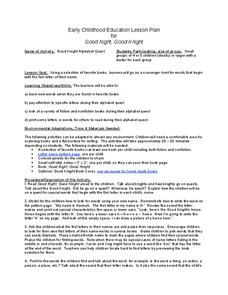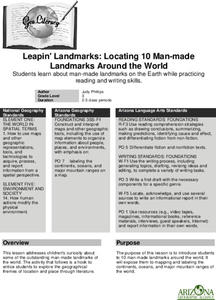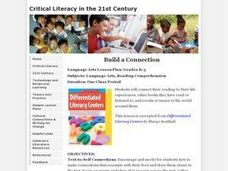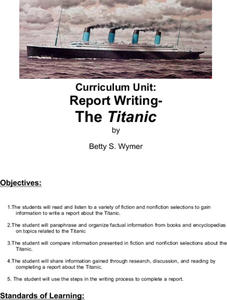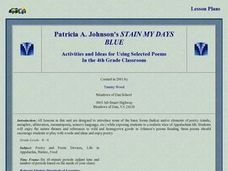Curated OER
Creating and Presenting Haiku with Kid Pix
Third graders research what a Haiku is and be able to answer related questions on an example of a Haiku. They create an original Haiku of their own using general Haiku characteristic guidelines. Students use Kid Pix to type in and...
Washington Office of Superintendent of Public Instruction
Using Our Senses to Observe
Look around and explore. Little ones use their five senses with some day-to-day activities designed to guide observation and apply STEM strategies. Young scientists learn through comparing/contrasting and...
Curated OER
Kumeyaay Indians
Useful for literary analysis, citing textual evidence, or summary skills, this lesson about the Kumeyaay Indians would be a good addition to your language arts class. Middle schoolers read novels and summarize the literature in their own...
Curated OER
Going Graph-y
Second graders listen to and dicuss the story Where the Wild Things Are. They play a pantomime game and act out various feelings so their classmates can guess. They listen for the frequency of certain words, and record their findings on...
Curated OER
Heartsongs Poetry by Mattie Stepanek
Use Mattie Stepanek’s Heartsongs book of poetry to inspire young poets to write about their own lives, experiences, and feelings. After reading the introduction to Mattie’s book, in which he talks about himself and his reasons for...
Curated OER
Introduce: Comparison and Contrast
Class discussions can really make concepts come to life. The class discusses the differences between compare and contrast, read a book, then talk about ways they can compare events or characters in the story. Good leading question are...
Curated OER
"O Captain! My Captain!"
Who was Walt Whitman, and what link does he have to president Abraham Lincoln? After Lincoln's assassination, Whitman wrote "O Captain! My Captain!" This poem and "When Lilacs Last in the Dooryard Bloom'd" are the focus of...
Penn State
Early Childhood Education Lesson Plan for Good Night, Good Knight
The book Good Night, Good Knight is the inspiration for this plan. Learners get into small groups to search for words in books that begin with their names and fill out and illustrate their own personal letter and name pages.
Curated OER
Leapin' Landmarks: Locating 10 man-made landmarks around the world
Third graders engage in a lesson which addresses their curiosity about some of the outstanding people-made landmarks of the world. They explore the geographical themes of location and place through literature.
Curated OER
"Spelldown" by Becky Mushko
Learners read Spelldown, by Becky Mushko and consider how it portrays the Appalachian community. They define and discuss vocabulary presented in the story and write a comparison/contrast paper analyzing two of the story's characters. The...
Curated OER
Primary Sources and Protagonists: A Native American Literature Unit
Introduce your middle schoolers to the lives of past Native Americans. First, learners work together to put photographs in a sequence. Then, using their sequence, they create stories to share with the whole class. No matter how old your...
Curated OER
Build a Connection
Learners discuss their personal connections with stories they've read in the past and identify techniques to connect with more stories. They create illustrations, construct task cards, and complete sentence stems based on books they read...
Curated OER
Where Do We Begin?
Primary learners grasp sequence of events by discussing morning routines and reviewing the story of Little Red Riding Hood. They explore the necessity of correct order of events. As a class, create a story with a beginning, middle, and...
Curated OER
Christopher Columbus: The Man, the Myth, the Legend
Learn more about maps by examining Christopher Columbus's voyage to the New World. Kindergartners will learn about basic map skills and how to identify the compass rose, oceans, and land masses. They will also discover the purpose of...
Curated OER
Analyzing the Use of Irony in a Short Story
Ninth graders examine how literature connects to real-life and see how irony aids in the development of theme. They read Shirley Jackson's The Lottery, and discuss elements of foreshadowing and situational irony. Then learners will write...
Curated OER
William Apess and the Mashpee "Revolt" of 1833
Prompt your class with the following question: What was the status of American Indians in Massachusetts during Jackson's presidency? To answer this question, class members will read a series of primary source documents (attached),...
Curated OER
Can You Build a Better Mousetrap?
Learners use a variety of linked sites to research information about student inventions and contests that are available for them. They research an invention they would like to see become available. They communicate their results to their...
Curated OER
Self-Monitoring Strategies and Vocabulary Games
Middle and high schoolers identify how to discover a word's meaning by exploring context clues and any pictures, diagrams, photographs, and charts that might be included. They continue this process with other examples and locate one on...
Curated OER
War Poetry, Journals and Letters: Viet Nam
Examine letters written during war-time. In this cross curricular history and English instructional activity, middle and high school scholars read letters and poems written by soldiers in the Vietnam war. They will examine the...
Curated OER
A River Ran Wild: An Environmental History
The Nashua River serves as the focal point of an investigation of the treatment of and care for natural resources. A reading of A River Rand Wild: An Environmental History by Lynne Cherry, launches the study and class members consider...
Curated OER
Narrative Writing vs. Explanatory Writing
The class discusses the different purposes an author has for writing. The focus of the discussion is on writing to tell a true story and writing to give information about a specific topic. There are writing purpose sorting cards embedded...
Curated OER
Figurative and literal language through the study of Shakespeare
Sixth graders explore figurative and literal language. They study literary devices through short pieces of Shakespeare's work. Then investigate Shakespeare's works and life.
Curated OER
The Titanic
Young scholars use various sources to compare and contrast information about the Titanic. In groups, they create a list of questions and use the internet to find the answers. They write a report with the new information and use their...
Curated OER
Stain My Days Blue
Students read several poems related to the life and culture of the Appalachia region. They are introduced to the poetic forms of simile, alliteration and onomatopoeia and respond to the poems through journal entries and poetry of their own.
Other popular searches
- Genre Fiction and Nonfiction
- Fiction and Nonfiction Text
- Nonfiction and Fiction
- Fiction Nonfiction Books
- Fiction and Nonfiction Events
- Fiction vs Nonfiction Books
- Nonfiction Fiction
- Twinning Fiction/nonfiction
- Fiction or Nonfiction Unit
- Fiction vs. Nonfiction Books
- Fiction/nonfiction Books
- Identify Fiction Nonfiction







